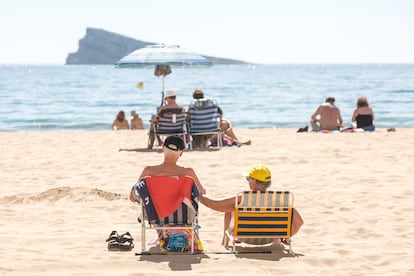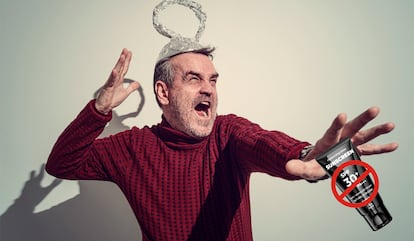‘Sunscreen is toxic’: The new conspiracy theory that is spreading through the internet
Move over, anti-vaxxers and flat-earthers: there’s a new movement on social media, one that wants to convince you that the need to protect your skin from the Sun is in fact an elaborate scheme designed to make you buy lotions

These days you can be an influencer of almost anything and succeed, dazzling an audience of millions that show their love in the form of engagement. And when we say “anything,” we mean anything. One needs to look no further than the new and unexpected crusade that this summer wants to impact our lives (and our epithelial cells): the advocates of the anti-sunscreen movement.
How tempting it is to consider ourselves, on the one hand, part of a select tribe of connoisseurs with access to a truth somehow denied to the rest of mortals and, on the other, the victims of an elaborate worldwide conspiracy. The proposition of these impromptu thought leaders rests on both aspirations of our late-capitalist egocentric personality. As a result of their influence, this summer there could be fewer people wearing sunscreen than last year — feeling proud and empowered by it, too. You might even hear about it at a beachside restaurant during your vacation.
The British personal trainer James Middleton is one of the most passionate defenders of this summer’s nonsense. On his Instagram account, where he is followed by 250,000 people, Middelton writes: “Think about it for a minute. They [pharmaceutical companies and health authorities] need you to believe that the sun is bad.” On Twitter, he calls on people to stop using sunscreen because “high levels of vitamin D make it almost impossible to develop an autoimmune disease.” Middleton is not an immunologist, an oncologist or any other kind of doctor. Regardless, his followers applaud the way he condemns the “dangerous myth” created by the industry to sell us sunscreen.
Gonzalo Segurado, dermatologist at the Skin Cancer Unit of the Pedro Jaén Group, explains that vitamin D is indeed important. “It is a necessary hormone to absorb calcium and phosphorus, two fundamental elements for the good health of bones and teeth. Due to its role in calcium metabolism, it is also implicated in cardiovascular health, fertility, in certain nervous pathologies, in autoimmune disorders and even its role in the development of some types of cancer is being studied.” However, Segurado points out that vitamin D is not determinant by itself, or is not exclusively so. “Having an adequate level in the blood does not protect against certain diseases either, because there are other factors at play.”

The expert acknowledges that some patients have doubts about whether sunscreen prevents the absorption of vitamin D. “Fifteen to twenty minutes of unprotected sun exposure on the face, arms or legs would be enough to absorb the necessary amount.” Others, says the doctor, resort to “tricks” to get tanned; among them, using a very low protection factor, wearing a very small amount of product, not using it on cloudy days or going to UVA tanning beds.
“There is no such thing as healthy tanning,” says the dermatologist. “The tanning of the skin is a defense mechanism that the body uses when it receives the aggression of the sun’s rays. You have to protect yourself adequately because those tricks only create a false sense of security that makes us more vulnerable to sun damage.”
In certain online communities and forums for supposed self-care and alleged natural medicine, a dangerous idea has been spreading: sunlight is not toxic, but sunscreen is. The argument is usually accompanied by nostalgic images from at least 150 years ago: our ancestors were clean of chemicals, they did not use SPF 50 and were never diagnosed with level III melanoma. They lived happily, gathering straw in the sun with their medieval caps — as can be deduced from a picture circulating on Twitter.
Imagine being so afraid of the SUN (the most life-sustaining force in our solar system) that you rub oxybenzone all over your body pic.twitter.com/QYsIU60FNm
— Tan Man (@reallytanman) April 19, 2023
Their vigorous metabolism was free of toxic molecules or hormone disruptors. The influencers, however, omit (or ignore) the well-documented fact that skin cancer was described by Hippocrates in the 5th century BC.
The American osteopath Joseph Mercola, a well-known Covid-19 conspiracy theorist, also insists on the wickedness of sunscreens. His advice, however, comes at a profit. His Wikipedia profile defines him, among other things, as an internet business personality; his strategy is to identify the toxic chemicals in sunscreens in order to pitch his followers his own alternative products. Despite all the scientific evidence linking UVA rays to the development of skin tumors, Mercola also considers this a myth.
José Aguilera, professor of photobiology at the University of Malaga and a member of the Spanish Academy of Dermatology and Venerealogy (AEVD) studies the presence and the ability to penetrate the skin of homosalate and octocrylene, two potential endocrine disruptors in sunscreen lotions. A study of the Spanish Organization of Consumers and Users (OCU) published last June advised against the use of 29 lotions because they contained one of these compounds. Aguilera explains that the experiments carried out to verify the alterations of these potential endocrine disruptors have been done in larvae, eggs and marine organisms.
“In humans, experiments have been carried out with the amount of product used to determine if there is a penetration of these compounds into the skin, and permeability and presence in blood samples have only been found from concentrations greater than 100 grams, a much higher amount than what a person uses on a daily basis.” The researcher also points out that no scientific study has found that homosalate and octocrylene produce alterations as endocrine disruptors.
The narrative of distrust of certain influencers regarding the pharmaceutical industry and health authorities gained strength during the Covid-19 pandemic, especially against the design of vaccines that could not eliminate the spread of the virus; only the development of more severe forms of the disease. In the case of sunscreens, a 2021 study that found benzene (a carcinogenic substance) in several brands gave rise to the theory that sunscreens kill more than the exposure to the Sun, an idea that coincided with a growth in cases of melanoma and other skin tumors, which experts attribute to several factors — none of them the use of sunscreen lotions. Dermatologists mention an increase in sports and outdoor activities, clothes that expose more skin in the summer, longevity, an increase in travel to destinations with high solar radiation and the use of tanning beds.
However, the arguments of the scientific community only seem to fuel the theories of some conspiracy defenders who boast ancient wisdom and almost spiritual powers; militants of conspirituality, an ideology where pseudoscience is mixed with quasi-religious beliefs about the functioning of the world and the human body, all embellished with a few half-truths, who want you to believe that the positive influence of a magnanimous star like the Sun, the nerve center of several civilizations, is being blocked by the vulgar chemical industry of the modern age. According to them, to be free, different and natural, you should not protect yourself from its rays. Don’t try this at home.
Sign up for our weekly newsletter to get more English-language news coverage from EL PAÍS USA Edition
Tu suscripción se está usando en otro dispositivo
¿Quieres añadir otro usuario a tu suscripción?
Si continúas leyendo en este dispositivo, no se podrá leer en el otro.
FlechaTu suscripción se está usando en otro dispositivo y solo puedes acceder a EL PAÍS desde un dispositivo a la vez.
Si quieres compartir tu cuenta, cambia tu suscripción a la modalidad Premium, así podrás añadir otro usuario. Cada uno accederá con su propia cuenta de email, lo que os permitirá personalizar vuestra experiencia en EL PAÍS.
¿Tienes una suscripción de empresa? Accede aquí para contratar más cuentas.
En el caso de no saber quién está usando tu cuenta, te recomendamos cambiar tu contraseña aquí.
Si decides continuar compartiendo tu cuenta, este mensaje se mostrará en tu dispositivo y en el de la otra persona que está usando tu cuenta de forma indefinida, afectando a tu experiencia de lectura. Puedes consultar aquí los términos y condiciones de la suscripción digital.









































